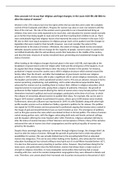How accurate is it to say that religious and legal changes, in the years 1625-88, did little to
alter the status of women?
Women in the 17th century had very few rights within the law and they were under the complete
control of their husbands and fathers. Progress for women was slow or even non-existent until the
time of the civil war. The role of the women was to generally to run a household and bring up
children; they were very rarely expected to do much else, and education for women would normally
go no further than being taught to read and write and then teaching their children to do so. There
were undoubtedly legal and religious factors that improved the status of women in the years 1625-
88, due to their near-equal acceptance in religious groups (such as the quakers) and the changes to
legislation that were made for their benefit. However, one must consider the extent of the
improvement to the status of women. Ultimately, the extent of change should not be overstated.
Attitudes towards women did not change for the majority of people, women’s place in society had
not shifted drastically after the extraordinary events that took place in the middle of the century,
and thus the basic structure of society remained intact, preventing any fundamental change to the
status of women.
When looking at the religious changes that took place in the years 1625-88, and especially at the
breakdown of government control of religion after 1640 and the emergence of the Quakers, it can
be argued that these changes did help to alter the status of women in this period. For instance,
puritanism’s impact across the country saw a shift in religious structure which centred around the
family rather than the Church, and after the breakdown of government control over religious
practices in 1640, women were able to play a significant role in certain religious movements, such as
the Quakers and Levellers, which questioned society's norms. This was an advance, because it led to
women preaching, prophesising, and publishing, and to wider educational opportunities being
advocated for women such as enabling them to instruct their children in religious education, which
required women to read and write, giving them a degree of authority. Moreover, the growth of
puritanism further helped towards altering the status of women since many female puritan’s found
themselves involved in political and social campaigns, particularly at the time of civil war, in which
the collapse of censorship allowed women to publish their ideas. For example, this can be seen in
August 1643 women's petition to parliament for peace, where up to 6,000 women were involved.
Furthermore, when john Lilburne was imprisoned in 1649, his wife Elizabeth along with other high-
profile Leveller women such as Katherine Chidley organized a petition for his release. The petition
was signed by 10,000 women and was presented to parliament arguing that women were created in
the image of god and should therefore have as much freedom as men. The emergence of petitions
such as this gave women the voice which was denied to them in formal politics. The status of women
varied among puritan sects, with the diggers advocating both male and female universal suffrage
and the Quakers offering the most freedom after 1650. Therefore, religious radicalism did help to
alter the status of women because of their tolerance and acceptance of them. Many of the sectaries
welcomed the vote of women into their congregations and the spiritual equality of women was
prized by the Quakers.
Despite these seemingly large advances for women through religious change, the changes didn’t do
much to alter the status of women. Although the growth of puritanism led to wider educational
possibilities for women, this was actually limited due to the prevailing belief that an educated
woman was dangerous. This can be seen when looking at the Quakers, who advocated for women’s
education founding just four schools willing to teach girls out of a total fifteen founded before 1671.
It is also true that women were preaching in puritan circles, however, they had been doing this for
many years, and particularly since the Reformation, women had always been a major source of
strength to religious minorities. In many Anabaptist communities they had long had an equal
standing with men, and in the London Independent congregations they were allowed to debate and
vote. Therefore, one cannot attach their increased role in puritan sects purely to the period of 1625-




